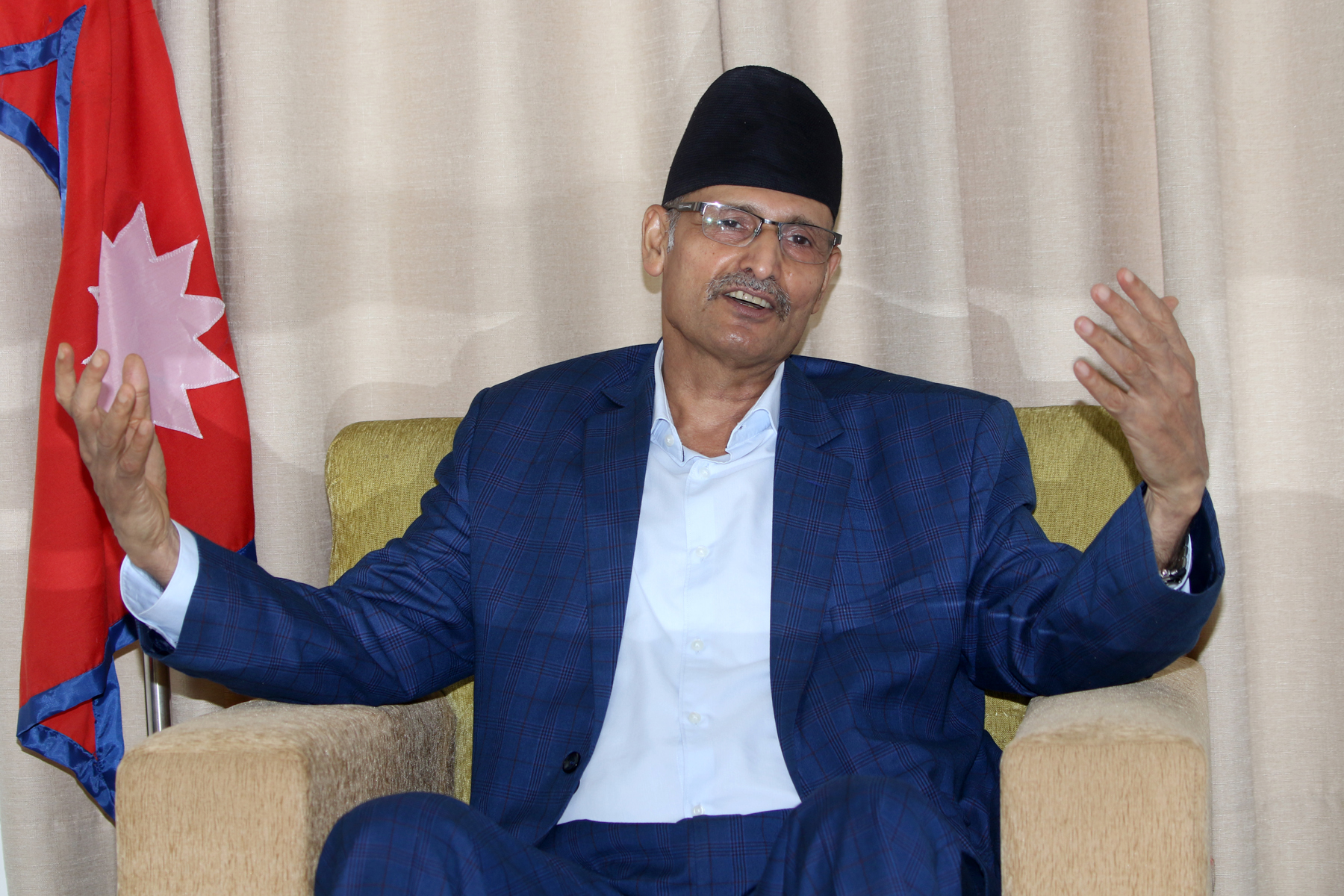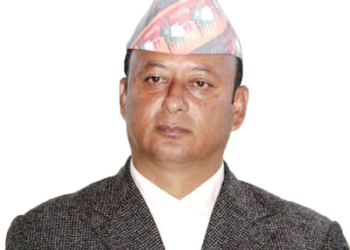KATHMANDU: Speaker Agni Prasad Sapkota has said initiative should be made to amend the constitution based on necessity so that nationality would be strengthened.
Speaker Sapkota said it during an interview he gave to the National News Agency on the occasion of the Constitution Day.
Nepal marks Asoj 3 (tomorrow) as the Constitution Day. The constitution promulgated in 2015 is mailed much as the most democratic and inclusive national charter Nepal ever has.
In this connection, the parliament has tried to rise above the traditional format and expects to meet people’s aspiration in line with constitution’s spirit.
Speaker Sapkota said, “Nepal is currently in the phase of implementation of constitution in full scale. Many laws contradicting the constitution were scrapped and new framed to suit the changed context. The parliament became successful to bring numerous laws to implement the constitution in the last three years.”
Following the elections in local, State and federal levels, the governments are formed and now operational. The bill on coordination among the local, state and federal governments has been passed, which would not only facilitate but accelerate various activities at all three layers.
The passage of the bill has paved way to unknot the problems surfacing among the governments.
The constitution has so far been amended twice- first for making it proportional and second for incorporating the revised map of the country.
Speaker Sapkota argued that the provision of 33 percent women’s participation in the State apparatus has been implemented well.
There is 33.83 percent participation of women in the federal parliament. In the local level, the provision of women as either chief or deputy chief is fully materialized.
Similarly, Dalit people are ensured participation with privileges. The policy and provision of inclusive and proportional representation has been fully enforced, he underscored.
To a question on State governments’ complaint of not getting necessary laws for inter-state coordination, Speaker Sapkota admitted that some were still not made.
Especially the regulations are not made and appointments are not made in constitution bodies.
However, it does not mean necessary laws are not made eg laws to implement the fundamental rights been be made within the stipulated timeframe.
So, time has come for practical implementation. Similarly, Speaker Spakota lauded the second amendment of the constitution reasoning it gave constitutional recognition to Nepal’s revised map that included Lipulek, Limpiyadhura and Kalapani.
Similarly, discussions were underway to address the grievances of Madhes-centric political parties. Their demands and voices are given space in the parliament as well.
The constitution is however amended as per the need and relevance, which needs broader discussion.
In response to a question whether the constitution addressed people’s aspiration over these five years since introduction, Speaker Sapkota said, “Although the people were of the view that their voices were raised in the parliament, there is a lot to do to address people’s demand.”
In the wake of the COVID-19 crisis, they were mulling how parliament could leverage technology and become visible with its activities.
Speaker Sapkota said, “The country has already adopted federal system. We have been facing problem of coronavirus pandemic in recent period. The local levels except some local levels have been carrying out works significantly to battle against coronavirus. There might be huge losses in the country during this pandemic if there were not local levels. The representatives of local levels have been working day and night in people’s happiness and pain. The people have been feeling its presence and thinking that federalism is necessary for the country.”
Responding to a query over non-effective activities of state governments, he said that there is a gap in coordination and difficulties have been surfaced to carryout activities under our jurisdiction due to unfavourbale situation in recent period.
He further said that activities like calling meeting of speaker and deputy-speaker of states, exchanging their experience, improving weaknesses and making necessary coordination are still remaining, saying that the three-tier governments have been founding moving ahead as per their own way.
Speaker Sapkota opined that lack of coordination is the reason behind the dispute between federal and state governments and added that federal and local government have been able to move ahead based on past experience but it is natural to surface problem in course of running state government as it is new practice in the country.
Similarly, explaining over the complaint that the federal government is looking state governments as only its unit, he said, “First of all we have to find out problems making coordination between three-levels and move ahead towards the path of resolving them.”
Discussion should be held on their issues in letter and spirit of the constitution. “We should find out whether or not the questions raised by state levels have any relevance and the genuine problems and concern should be resolved.”
The Speaker opined that problems might surface in course of running state and local governments in the beginning as federalism is new practice in our country and such problems should be resolved soon.
He said, “I think there is some problem and weaknesses on the issue of guidelines. We from the side of federal parliament have made policy, plan and program.”
“We have not been able to work due to some circumstances. The federal government should create environment conducive to work the state and local governments towards as per the Constitution,” he said adding that the State and local governments are not the units of the same government. The constitution has clearly mentioned about it.
The state and local governments can get suggestions from federal government. The federal government should play the role of guardian.
Responding to a question regarding the implementation aspect of the fundamental rights enshrined in the constitution, the Speaker said the constitution has given much importance to the right to education, food, health and shelter.
“We are at a challenging situation brought about by the COVID-19 pandemic and have given special emphasis to health-related matters at present,” he said further adding that despite this, we have not been able to provide accessible and affordable health services to the citizens.
It is the duty of the state to resolve the most common and general of the problems faced by the citizens since we are practising the socialism-oriented state envisaged by the constitution.
The state should work towards ensuring the fundamental rights of the people. Talking about the challenges regarding the implementation of the constitution, the Speaker stated that there is a big challenge.
Challenges are there before not only our country but in other countries as well. “We have a shortage of means and resources. It is the truth. But we can overcome the challenges if we take the people into confidence and sincerely work towards fulfilling the aspirations of the people as per the spirit of change through dedication and commitment,” he said.
The people look up to the government in hard and unusual times like at present and not in normal times. The state should instill a sense of confidence in the people at such times that the government is with them.
“Government, the parliament and all the state organs should instill confidence in the people that works are going on. This should be translated into practice ot only by presenting a to-do list before the people, but through action,” he asserted.
The Speaker emphasized that it was the duty of the government and the state apparatus to implement the constitution in its letter and spirit.
It is in the trying times like at present that gate to new possibilities should be opened. Even the constitution can be developed in a new level.
Asked to make self-assessment regarding his role as the Speaker looking at the present situation of constitution’s implementation, Speaker Sapkota said issues were moving ahead as delineated in the constitution and he was working to further enhancing the role of the parliament and making it effective as per his commitment.
“We are resolved to making the parliament more responsible towards the people. Several topics mentioned in the constitution have been implemented while others are on the way of implementation. Overall, we are heading towards the positive direction. Any shortcomings and lacuna should be rectified,” he added.
In his message to people on the occasion of the Constitution day, the Speaker praised the constitution saying it has incorporated the basic aspirations of the people as well as all dimensions of the democratic norms and values.
It is oriented towards building a new state system and towards achieving socialism.
“All should move ahead as per the spirit of the premable of the constitution. All should get the opportunities and there should not be any discrimination. The Democracy Day is a day to make commitment for providing equal opportunity to all and fulfilling the goals of the constitution. It is also a day to make an evaluation of the weaknesses in the past and move ahead by correcting them, and work keeping the people at the centre. We should move ahead by beoming more sincere.”









Comment